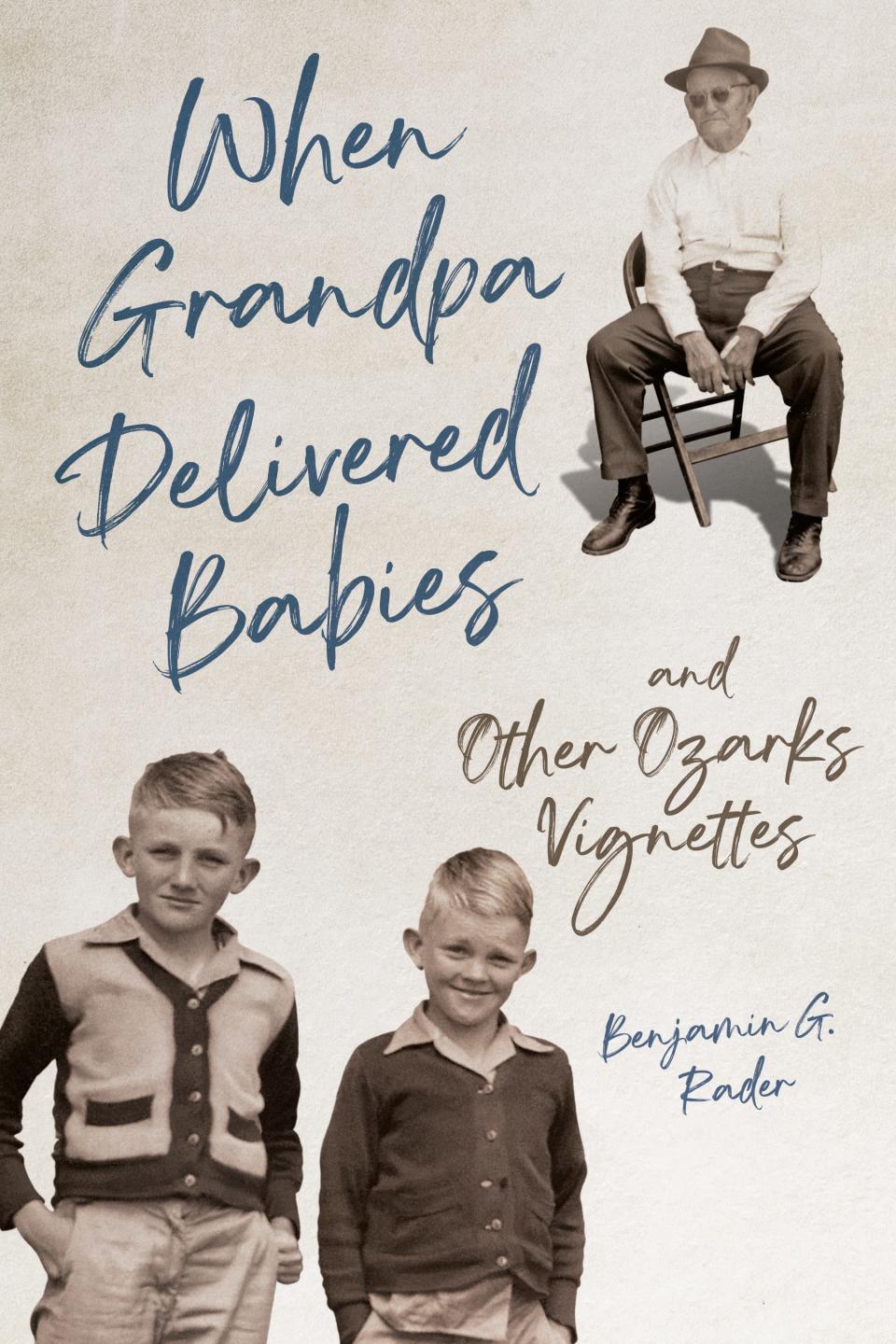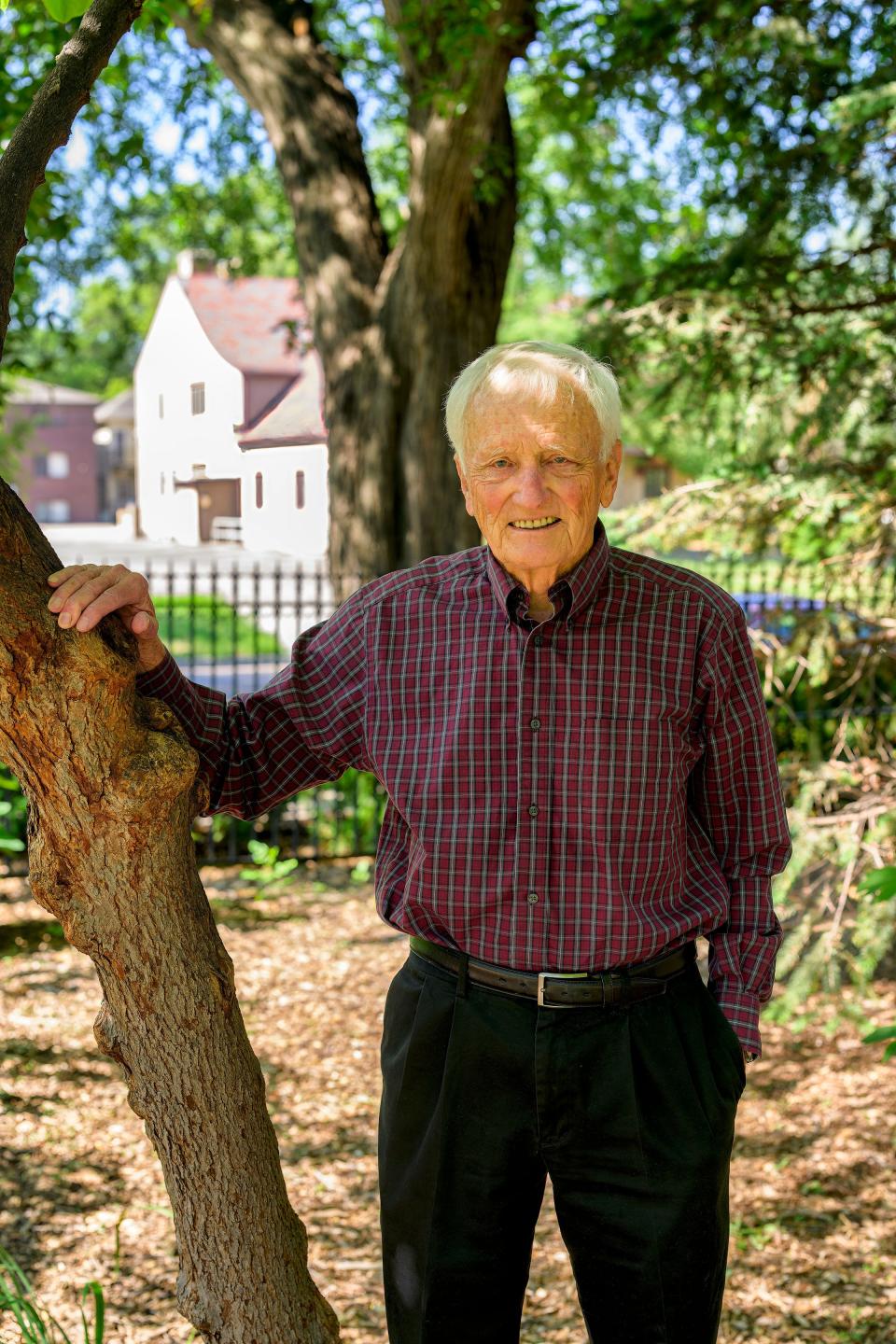'Unconventional' memoir shares stories of childhood in Ozarks hollers during 1930s-'50s
Since growing up in Shannon County's rugged terrain in the 1930s and '40s, Benjamin Rader has been a keeper and teller of stories, whether they be about walking to school in the rural Ozarks or breaking international news in his one-room schoolhouse.
Until he was 9 years old, Rader, who is now 88, grew up in a log cabin along Mahans Creek, a stream in southeastern Shannon County. Despite being raised by "poor farmers," Rader's family was fortunate enough to own a battery-powered radio.
"When I was in the first grade on Dec. 8, 1941 — that's one day after the Japanese bombed Pearl Harbor — I either heard this on the radio or my parents told me this, I'm not sure. In any case, when I arrived to this one-room school, the Delaware School near Eminence, ... I announced this (the Pearl Harbor bombing) to the teacher and students and my recollection is that they were stunned, they did not know that the Japanese bombed Pearl Harbor," Rader recounted. "I eventually became the reporter of the news at school because we had a radio, which was somewhat unusual."
This story, and many others from his childhood, make up Rader's new book, "When Grandpa Delivered Babies and Other Ozarks Vignettes," which was released Tuesday. Published by the University of Illinois Press, the 132-page "unconventional memoir" provides readers with an inside look into growing up in the Ozarks in the 1930s-1950s. The book not only explores Rader's upbringing but his family's influence on the Shannon County area, dating back to the late 1800s.

"When Grandpa Delivered Babies" is organized into four parts: "The Clear, Cold Water of Mahans Creek," (growing up in rural Shannon County); "The People There Even Drank Rainwater from Cisterns," (adolescence in Howell County); "I Would Choose to Live in a Town or Beside a Very Country Road" (a continuation of the Rader family's life in Howell County); and "Are We in the Ozarks Now?" (Rader's reflections on the Ozarks after moving away for college). Each part is made up of a series of vignettes.
"These very short vignettes or stories, in which I often found to deploy a sense of humor, deal primarily with my direct, personal experience with growing up in this unusual physical and cultural habitat," Rader said.
More than seven years of recollecting, writing
"When Grandpa Delivered Babies" is not Rader's first published book. He's written several about sports, including "Baseball: A History of America's Game" in 1992. His most recent book, "Down on Mahans Creek: A History of an Ozarks Neighborhood" was released in 2017 and examines Mahans Creek throughout the 19th and 20th centuries. Unlike "When Grandpa Delivered Babies," "Down on Mahans Creek" is solely a historical recollection of the area and does not include personal anecdotes.
But as he was working on "Down on Mahans Creek," Rader felt like he was leaving out some "interesting stories" about life in the rural Ozarks. So he began to write those down separately, starting around 2017.
Although the majority of the stories in "When Grandpa Delivered Babies" are ones Rader recounted on his own, he did consult several family members, mostly his younger brother Mike.
Initially, Rader thought he would self-publish these stories or work with a vanity press, a publishing house where the authors pay to have the book published. But to his surprise, the University of Illinois Press — which published "Baseball: A History of America's Game" — was interested. Following some positive feedback from anonymous reviewers and minimal edits, "When Grandpa Delivered Babies" was ready to go.
As for which stories made the cut, Rader said his only "criteria" were that he found them entertaining.
"When you look back at your early experiences, some of them just stick in your mind, either because they are dramatic or emotional or had something quirky about them that you remembered much more graphically than you did others," Rader explained. "I was also looking for vignettes that people might find kind of surprising, humorous."
One of these stories, which also inspired the book's name, is how Rader's grandfather Alford "Raz" Eddings often served as a midwife, delivering all 11 of his children.
"When the time came for his wife, Florence, to give birth, he hung the family's kitchen table oilcloth out on the clothesline," Rader writes in the book's preface. "He then ordered the children to go down to McHenry Creek and play. When the birth was completed, he took down the oilcloth. His children then knew that they could return to the house and meet one or more of their new siblings."
Traditionally, midwives — healthcare providers who care for mothers and newborns around childbirth — have been women. But it was commonly known in Shannon County that Eddings helped deliver his babies. Although he didn't even have a grade school education, Eddings was known in the community as a sort of "local doctor," Rader said.
More about Rader
Benjamin Rader was born to Lydia and Lowell Rader on Aug. 25, 1935, during the height of the Great Depression. After the first nine years living in that Mahans Creek log cabin, the family moved to the Schneider neighborhood in Howell County, which is about 6 miles outside West Plains.

But Rader's family history in the rural Ozarks goes back much further. His great-grandmother Nancy Jane Childress Rader arrived in the Ozarks from rural Kentucky in 1880 by buckboard wagon, Rader explains in his book. It was here that she settled, remarried (she was a widow) and had children. By 1910, the Rader family was made up of 71 people, the largest family in the Delaware Township. Speaking with the News-Leader on Monday, Rader said he has many kin who still live in the area.
After graduating from West Plains High School in 1953, Rader moved to Wichita, Kansas, where he worked for two and a half years as a jig builder for Boeing Aircraft Company. But constructing structural components of airplanes wasn't in the cards for Rader. He returned to the Ozarks, where he attended then Southwest Missouri State University, obtaining a bachelor's degree in history.
Though he may have come from the Ozark hollers, Rader had some leverage at SMS. His great uncle Lawrence Pummill was then the head of the mathematics department and is who Pummill Hall was named after when it was constructed in 1957.
When registering for his first semester of classes in the SMS gymnasium — this is where all students registered for classes at the time — Rader recalled his great uncle "racing" to his aid.
"My great uncle Pummill came running across the gym — he was about 65 probably; he wasn't a youngster — and he introduced me to the history faculty," Rader said. "I think I had an advantage over other people after that. He probably commended me as a student."
After SMS, Rader attended graduate school at the Oklahoma State University and then received his doctorate from the University of Maryland. Rader has taught at several universities throughout his career but spent the majority of his time as a history professor at the University of Nebraska-Lincoln. He retired in 2009.
Where can you buy 'When Grandpa Delivered Babies'?
University of Illinois Press: $19.95 for paperback, $14.95 for eBook, $110 for cloth
Amazon: $19,95 for paperback, $110 for hardcover
Greta Cross is the trending topics reporter for the Springfield News-Leader. Follow her on X and Instagram @gretacrossphoto. Story idea? Email her at gcross@gannett.com.
This article originally appeared on Springfield News-Leader: 'Unconventional' new memoir shares stories of growing up in Ozarks

